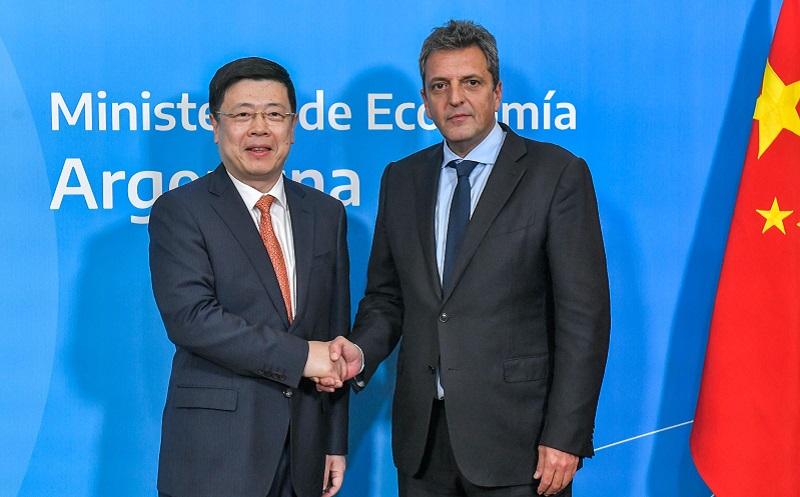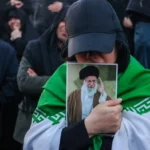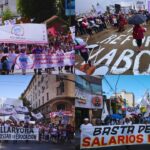
Photo: Ministry of Economy.
The Minister of Economy, Sergio Massa, will be this week in China that will be held mars 30 and the Wednesday May 31 in Shanghai a meeting of the New Development Bank (NDB), bank of the BRICS, where the change of one of the articles of the financial entity will be evaluated to obtain the financing of Brazilian imports (using reais instead of dollars) that President Lula da Silva negotiated with President Alberto Fernández. The president of the Central Bank, Miguel Pesce, Marco Lavagna and the national deputy Máximo Kirchner, among other officials, will participate in the delegation.
The IMF has not yet responded positively to the disbursement advance requested by the Government, meanwhile the US-friendly minister seeks to obtain Chinese funds and balances the tensions between the United States and China. The Biden government asked the Argentine president when they met in March that Chinese businesses not enter the country, thus vetoing the tender for the 5G telecommunication spectrum, the construction of nuclear power plants, participation in the waterway and other infrastructure projects strategic.
Despite the US rejection the Minister of Economy will have meetings with the representatives of Ganfeng Lithium y Tsingshan Holding Group (mining and lithium extraction), CET – State Grid (electric power transmission), China Gezhouba Group Corporation (CCWG) (represas), Power China (energy), and Tibet Summit Resources (mining). In search of funds, the country is auctioned off.
The Economy Minister’s agenda includes a stop in Beijing to negotiate the extension of the use of authorized yuan in bilateral trade corresponding to the swap con China to US$ 10,000 million. The swap is for US$ 18,000 million, at the end of 2022 the Government announced that the Asian giant authorized Argentina to freely dispose of US$ 5,000 million of that total. Now Massa will negotiate an increase in these freely available currencies. The Government announced that it activated the swap with China to pay in May with yuan US$ 1,040 million corresponding to imports from the Asian country.
Massa’s negotiations aim to finance imports in other currencies given the weakness of the Central Bank’s reserves. In the first quarter of the year the trade deficit (more was imported than exported) was US$ 126 million. The trade deficit with China in the same period was US$ 2,597 million, and with Brazil US$ 1,762 million, according to data from INDEC. The imports of both countries accounted for 42% of the total in the first four months of the year. The agreements with China and Brazil would give Massa some breathing room, but the bleeding of dollars does not stop to finance the rest of the imports for being a backward and dependent economy, for debt payments (private and public), the remittance of profits from large foreign companies and interventions in the exchange market that could be accelerated if there are new currency runs.
Argentina is saved with China? The Asian country is not a benevolent actor in the world as some progressive sectors maintain. China plunders the natural commons in dependent countries like ours. In addition, he sought to expand his representation in the organizations that continue to be dominant, as detailed by Esteban Mercatante in “The rise of China and the illusions of a benign multipolarity.” Thus, the Asian giant has a third place due to its participation in the capital of the IMF contributed by the different countries and weight in the vote, which is 6%. This means that China “is a participant in the decisions that are made in terms of loans, and, what is more important, in the conditions that are associated with them.”
New pilgrimage to Washington days after the lists close
Sergio Massa does not forget his friends from the north. As he reported in the media the minister will travel again to Washington to negotiate with the Fund, is expected to travel on June 10. The date is close to the closing of the lists, June 14 is the deadline for the presentation of electoral alliances, while June 24 is the end of the period for the presentation of lists of pre-candidates.
The tension with the Fund is around what the minister will do with the dollars, will they be squandered in attending to new bullfights? the IMF wants them to be used to pay maturities. According to a report from the Congressional Budget Office, Between May and December of this year, most of the maturities in foreign currency correspond to payments to the IMF for a total of US$ 12,045 million. In this sense, the Fund demands a devaluation, there is talk of an official dollar at $350. But a jump in the exchange rate will push prices up and the minister knows that if inflation accelerates he will no longer have a chance to be a candidate.
Massa wants to be a candidate, in the act of May 25 behind the figure of Cristina Fernández was the Minister of Economy and also the Minister of the Interior, Wado de Pedro. The unknown remains: will the minister be a candidate? the economy is not helping him. If so, who gets the “hot potato” and fills the vacant position?
The economy slows down
On the long road to the elections the economy is deflating and prices run. Last week INDEC announced the Monthly Estimator of Economic Activity (EMAE) so alone rose 0.1% in March compared to February and thus showed a slowdown compared to previous months. In the first quarter, economic activity registered an increase of 1.5%.
The Survey of Market Expectations (REM) of the Central Bank estimates that the economy will deepen its recessive trend, and the Gross Domestic Product will fall 3.1% this year.
The drought affected economic activity, the agreement with the Fund and its recipes imposed recessive trends in the economy such as the rise in interest rates that make credit and consumption more expensive. He tax adjustment to meet the goal of the organization and the wages who are by behind inflation also They help slow down the economy.
For his part, May inflation will remain at high levels. The consulting firm EcoGo projects that inflation this month will be at 9%, the consulting firm Analytica calculated 8.9%. Meanwhile, the consulting firm LCG pointed out that “the market discounts 8.5% inflation from the base in May, and some private projections even place it above that value.”
The roads that the economy will travel in the coming months are winding and a fall to the precipice cannot be ruled out. The critical level of reserves, the role of the IMF, and electoral uncertainty could spark new currency runs driven by the usual suspects (bankers, agro-exporters, big businessmen, speculators), which will aggravate inflation and cause a further deterioration in trading conditions. life of the popular majority. An intermediate scenario with the assistance of the Fund will give time for the electoral transition, but the body is the same as always, sooner or later it will press for greater looting. We must prepare to face the adjustment plans underway.
Source: www.laizquierdadiario.com

